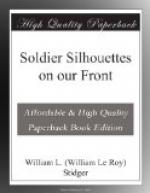Two things I shall never forget. One was the sight of a Y. M. C. A. hut that I saw in a town far back of the trenches. It was in the town where General Pershing’s headquarters are located. On the very tip of the hill above me was the hut. Its every window was a blaze of light. It was the one dominating, scintillating building of the town, a big double hut. When I climbed the hill to this hut I found it crowded to its limits with men from everywhere. The rest of the town was dark and there was little life, but here was the pulse of social life and comradeship, and here was the one blaze and glory of light.
The other sight that I shall not forget was up within a few hundred yards of the German lines. It was night. We were returning from our furtherest hut “down the line.” We met a crowd of American soldiers tramping through the snow and mud and cold. They were shivering even as they walked. We stopped the machine and gave them a lift. I asked one of the lads where he was going. He said: “Down to the ‘Y’ hut in ——.” I said: “Where is your camp?” He replied: “Up at ——.” I said: “Why, boy, that’s four miles away from the hut.” “We don’t care. We walk it every night. It’s the only warm place in reach and the only place where we can be where there are lights at night and where we can get to see the fellows and write a letter. We stay there for an hour or two and tramp back through this —— (censored) mud to our billets.”
And of all the lights o’ war one must know that the lights of the Y. M. C. A. huts cast their beams not only into the hearts of these lads but across the world, and sometimes I think across the eternities, for in these huts innumerable lads are seeing the light that never was on land or sea, and are finding the light that lights the way to Home. And these are the lights o’ war.
XIII
SILHOUETTES OF SUNSHINE
There is laughter and song and sunshine among our boys in France. Let every mother and father be sure of that. Your boys are always lonely for home and for you, but they are not depressed, and they are there to stay until the job is done. There are times of unutterable loneliness, but usually they are a buoyant, happy, human crowd of American boys.
Those of us who have lived with them, slept with them, eaten with them, come back with no sense of gloom or depression. I say to you that the most buoyant, happy, hopeful, confident crowd of men in the wide world is the American army in France. If you could see them back of the lines, even within sound of the guns, playing a game of ball; if you could see them putting on a minstrel show in a Y. M. C. A. hotel in Paris; if you could see a team of white boys playing a team of negro boys; if you could see a whole regiment go in swimming; if you could see them in a track meet, you would know that, in spite of war, they are living normal lives, with just about the same proportion of sunshine and sorrow as they find at home, with the sunshine dominant.




